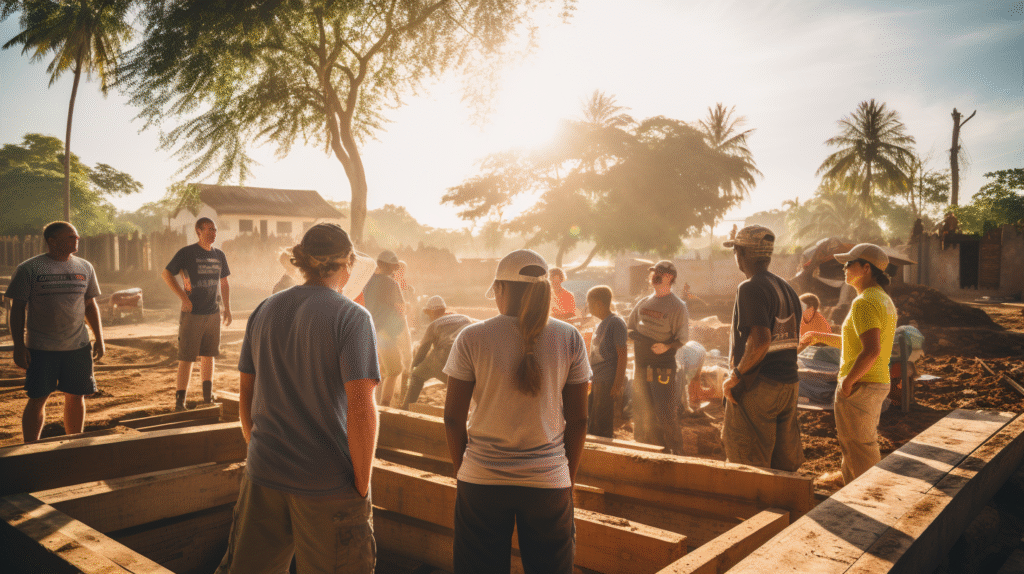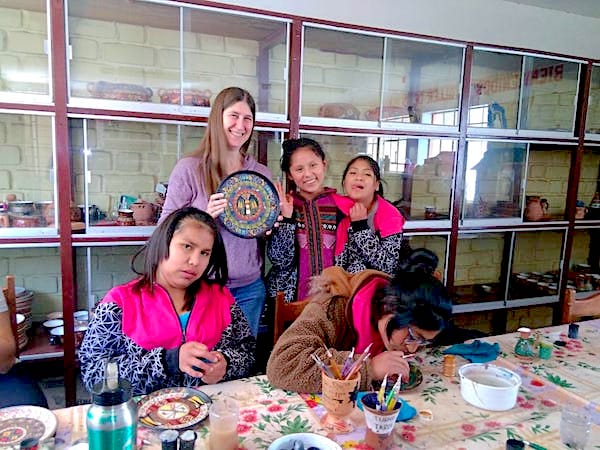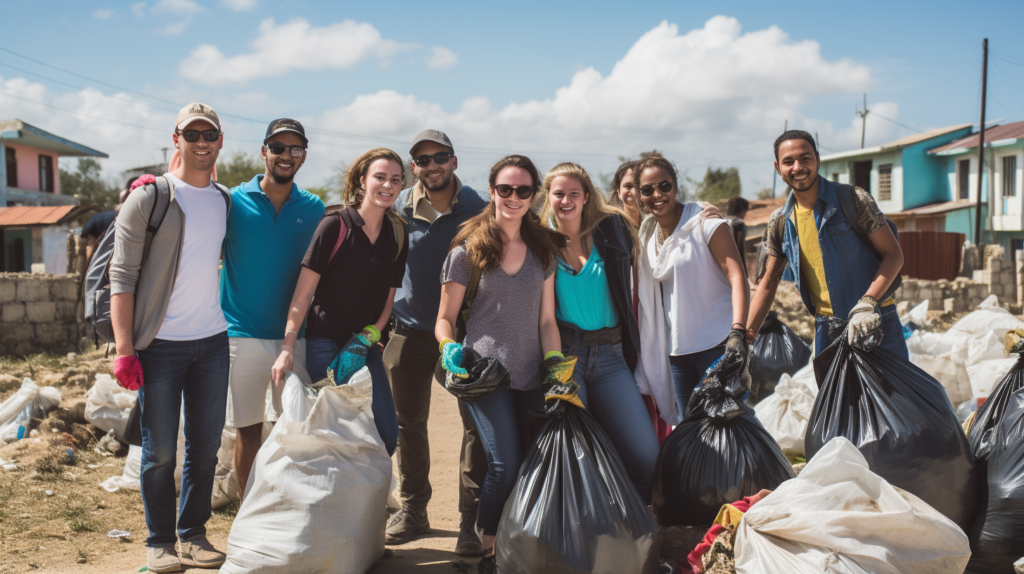Traveling is a transformative experience that allows us to explore new cultures, broaden our horizons, and create cherished memories. While traditional travel focuses on leisure and personal enjoyment, there is a growing trend that is changing the way we explore the world – humanitarian travel. Humanitarian travel combines our passion for exploration with a desire to make a positive impact on the communities we visit.
In this article, we will dive into the world of humanitarian travel, exploring its definition, purpose, and the benefits it offers. We will also discuss the various types of humanitarian travel experiences and provide valuable insights on how to prepare for a humanitarian trip.
Furthermore, we will delve into the ethical considerations involved in humanitarian travel and highlight some inspiring success stories. Finally, we will explore the future of humanitarian travel and the role it plays in embracing responsible tourism practices.

So, if you’re curious about how you can travel with a purpose and contribute to sustainable development, join us as we embark on a journey to understand why humanitarian travel is changing the way we explore the world. Let’s make a difference together!
Understanding Humanitarian Travel
Humanitarian travel refers to a type of travel that focuses on making a positive difference in the world by helping people in need. It goes beyond traditional tourism and allows individuals to contribute to sustainable development while exploring different cultures and communities. Let’s dive deeper into understanding humanitarian travel and why it is becoming increasingly popular.
Definition and Purpose
Humanitarian travel involves traveling to a destination with the intention of supporting and assisting communities in need. It can take various forms, such as volunteering abroad, participating in humanitarian projects, or exploring off-the-beaten-path destinations. The purpose of humanitarian travel is to make a positive impact, promote cross-cultural understanding, and contribute to the overall well-being of the communities visited.
Importance of Cultural Awareness
One of the key aspects of humanitarian travel is cultural awareness. When engaging with communities, it’s crucial to respect and understand their cultural norms and customs. This helps to build trust and establish meaningful connections with the locals. By immersing oneself in a different culture, travelers gain insights into the lives and challenges faced by people in different parts of the world.
Contributing to Sustainable Development
Humanitarian travel also plays a significant role in sustainable development. By actively participating in projects that focus on education, healthcare, infrastructure development, and environmental conservation, travelers contribute to the long-term well-being of communities. Such initiatives help create employment opportunities, improve living conditions, and protect natural resources.
Quote: “Traveling is not just about seeing new places, it’s about making a positive impact on the lives of others and leaving a lasting legacy.” – Unknown
In conclusion, understanding humanitarian travel involves recognizing its purpose of making a positive difference, embracing cultural awareness, and contributing to sustainable development. It offers a unique opportunity to explore the world while leaving a meaningful impact on the lives of others. So, if you’re passionate about travel and making a difference, humanitarian travel might be the perfect way for you to embark on a transformative journey.

Benefits of Humanitarian Travel
Humanitarian travel offers a multitude of benefits to both the traveler and the communities they work with. It’s not just about giving back; it’s also about personal growth, cultural exchange, and creating a positive impact. Here are some of the key benefits of embarking on a humanitarian travel experience:
Personal Growth and Empathy
-
- Broadened Perspectives: One of the most significant benefits of humanitarian travel is the opportunity to gain a broader perspective on life. By immersing yourself in a different culture and witnessing the daily challenges faced by others, you develop a greater appreciation for what you have and a deeper understanding of the world around you.
- Enhanced Empathy: Humanitarian travel allows you to connect with people from different backgrounds and walks of life. By listening to their stories and understanding their struggles, you develop empathy and compassion, which can positively impact your interactions with others even outside of your humanitarian experience.
“Humanitarian travel has the power to transform not only the lives of those you serve but also your own. It opens your eyes, broadens your mind, and nurtures your empathy.”
Opportunity for Cultural Exchange
-
- Immersive Experience: Humanitarian travel provides an immersive experience where you can fully immerse yourself in the local culture and way of life. You have the opportunity to learn about traditions, customs, and daily routines that may be vastly different from your own. It’s a chance to embrace diversity and expand your cultural horizons.
- Language Skills: When volunteering or participating in humanitarian projects, you have the opportunity to interact with locals, improving your language skills and fostering meaningful connections. Learning even a few phrases in a different language can go a long way in building bridges and forming bonds.
“Exploring a new culture and embracing its traditions can be a transformative experience. It allows you to appreciate the beauty of diversity and gain a deeper understanding and respect for different ways of life.”
Making a Positive Impact
-
- Helping Others: Humanitarian travel gives you the chance to make a tangible difference in the lives of those in need. Whether it’s volunteering at a local clinic, teaching children, or building infrastructure, you have the opportunity to contribute to meaningful projects that have a direct impact on local communities. Your efforts can help improve access to education, healthcare, clean water, and more.
- Creating Long-lasting Change: Beyond immediate assistance, humanitarian travel can also contribute to long-term change. By working with local organizations and communities, you can help implement sustainable solutions that empower individuals and create a ripple effect of positive transformation. Through your efforts, you become a catalyst for long-lasting change.
“Every small act of kindness and every effort to improve someone’s life counts. Humanitarian travel offers the opportunity to leave a lasting impact and create a brighter future for individuals and communities.”
Humanitarian travel offers a unique and fulfilling experience that goes beyond typical vacations. It allows you to grow as an individual, connect with different cultures, and make a positive impact in the world. By embracing this form of travel, you not only enrich your own life but also contribute to creating a more compassionate and interconnected global community. So, why not embark on a humanitarian travel adventure and discover the transformational power it holds?

Types of Humanitarian Travel Experiences
When it comes to humanitarian travel, there are various ways in which individuals can get involved and make a difference in the world. Here are three types of humanitarian travel experiences that you can consider:
- Volunteering Abroad: Volunteering abroad allows you to directly contribute your time, skills, and efforts to a specific cause or project in a foreign country. Whether it’s teaching English in a local school, building houses for communities in need, or assisting with healthcare initiatives, volunteering abroad provides a hands-on opportunity to make a positive impact.
- Participating in Humanitarian Projects: Another type of humanitarian travel experience involves actively participating in specific projects aimed at improving the lives of disadvantaged communities. This could include working with organizations that focus on improving access to clean water, providing medical assistance in underserved areas, or supporting sustainable farming initiatives. By getting involved in these projects, you can directly contribute to the long-term development and well-being of communities in need.
- Exploring Off-the-Beaten-Path Destinations: Humanitarian travel doesn’t always have to involve volunteering or participating in specific projects. It can also be about exploring lesser-known destinations that have been affected by issues such as poverty, environmental degradation, or social inequality. By visiting these destinations and engaging with local communities, you can gain a deeper understanding of the challenges they face and contribute to their economic growth through responsible tourism practices.
No matter which type of humanitarian travel experience you choose, it’s essential to do your research and ensure that your efforts align with the principles of ethical and sustainable travel. By understanding the specific needs and priorities of the communities you intend to support, you can maximize the impact of your travel experience and create meaningful change.
“Travel is the only thing you can buy that makes you richer.” – Anonymous
Preparing for a Humanitarian Trip
Preparing for a humanitarian trip is an important step towards making a meaningful impact and ensuring a safe and fulfilling experience. Whether you are volunteering abroad, participating in humanitarian projects, or exploring off-the-beaten-path destinations, proper preparation is key. Here are some essential steps to take before embarking on your humanitarian journey:
Researching Destinations and Organizations
- Choose the right destination: Research various destinations and find one that aligns with your interests and goals. Consider the cultural, social, and economic aspects of the place you want to visit.
- Identify reputable organizations: Look for organizations that have a well-established track record in humanitarian work. Read reviews, reach out to past volunteers, and assess their impact and transparency. Ensure that the organization aligns with your values and goals.
- Learn about the local context: Familiarize yourself with the country’s history, culture, customs, and social issues. This will help you better understand the community you will be serving and interact with them in a respectful manner.

Understanding Cultural Norms and Customs
- Cultural sensitivity: Have an open mind and be respectful of the local customs, traditions, and beliefs. Learn some basic greetings and common phrases in the local language to show your willingness to engage with the community.
- Dress appropriately: Research the appropriate dress code for your destination and respect local norms. Dressing modestly can help you integrate better and show respect for local values.
- Learn about local etiquette: Familiarize yourself with the do’s and don’ts of the local culture. For example, certain gestures or body language might be offensive in some cultures, while others may have specific rules regarding mealtime or interactions between genders.
Health and Safety Considerations
- Consult a healthcare professional: Schedule a visit with a healthcare professional to ensure you are up to date on vaccinations and receive any necessary travel medications.
- Purchase travel insurance: Accidents and unforeseen events can happen anywhere. Make sure you have travel insurance that covers medical emergencies, trip cancellations, and lost luggage.
- Safety precautions: Familiarize yourself with the local safety guidelines and stay informed about any potential risks or travel advisories. Register with your embassy or consulate and share your itinerary with family or friends for added security.
By taking these steps to prepare for your humanitarian trip, you will be better equipped to contribute effectively and ethically while ensuring your own safety and well-being. Remember, preparation is the key to a successful and impactful journey.
“The more prepared you are, the more impactful your humanitarian trip will be.”
Ethical Considerations in Humanitarian Travel
Humanitarian travel is a powerful way to make a positive impact and contribute to sustainable development around the world. However, it’s crucial to approach these experiences with ethical considerations in mind. In this section, we will explore some important factors to consider when engaging in humanitarian travel.
Avoiding Voluntourism and Organizational Pitfalls
One of the key ethical considerations in humanitarian travel is avoiding voluntourism. Voluntourism refers to the practice of engaging in short-term volunteer work primarily for personal gratification or entertainment, rather than the genuine desire to make a lasting difference in the lives of local communities. To avoid falling into the voluntourism trap, keep the following in mind:
- Research the organization or project you are planning to work with. Look for transparency, long-term goals, and a clear impact in the community.
- Avoid organizations that offer experiences that seem too good to be true or focus heavily on marketing rather than actual impact.
- Ask questions about the organization’s approach to sustainability and community empowerment. Ensure they prioritize the needs and aspirations of the local community.
Respecting Local Communities and Traditions
Respecting the local communities and traditions you encounter during your humanitarian travel is essential. Here are some ways to ensure respectful engagement:
- Educate yourself about the customs, traditions, and etiquette of the destination you are visiting. This will help you navigate social situations with respect.
- Dress appropriately and modestly, following local cultural norms. Pay attention to any specific dress codes or restrictions, especially in religious or conservative communities.
- Be mindful of your language and behavior, ensuring you are polite, sensitive, and open-minded when interacting with locals.
- Seek consent before taking photographs or engaging in any potentially intrusive activities. Always ask for permission and be mindful of the privacy and dignity of individuals you encounter.

Supporting Sustainable Initiatives
Another important ethical consideration in humanitarian travel is supporting sustainable initiatives. This involves actively seeking out organizations and projects that prioritize long-term sustainability, community empowerment, and environmental conservation. Here’s how you can support sustainable initiatives:
- Look for organizations that involve local communities in decision-making processes and help build local capacity.
- Choose projects that prioritize environmental sustainability and conservation efforts, such as eco-tourism initiatives or wildlife protection programs.
- Support local businesses and contribute to the local economy by purchasing locally-produced goods and services.
- Be open to learning and understanding the challenges faced by local communities, and encourage meaningful dialogue that fosters mutual respect and understanding.
By considering these ethical considerations in your humanitarian travels, you can ensure that your impact is positive and sustainable, leaving a lasting legacy of empowerment and support for the communities you encounter.
“Ethical travel is about more than just being mindful of your carbon footprint. It’s about respecting local cultures and communities, understanding the issues they face, and supporting initiatives that make a real difference.”
Success Stories in Humanitarian Travel
Humanitarian travel has the power to create meaningful change and transform local communities. Over the years, there have been many success stories that demonstrate the positive impact of humanitarian travel. These stories inspire us to engage in this transformative form of travel and make a difference in the world.
Here are a few remarkable success stories in humanitarian travel:
Case Study 1 – Implementing Clean Water Systems in Rural Communities
In many developing countries, access to clean water is a significant challenge. Humanitarian organizations have played a crucial role in implementing clean water systems in rural communities, providing safe and sustainable sources of water. These initiatives have had a profound impact on the health and well-being of the local population.
For instance, a non-profit organization called “Water for Life” initiated a project in a remote village in Kenya. They installed water filtration systems and trained local community members on maintenance and hygiene practices. As a result, the village now has access to clean drinking water, reducing waterborne diseases and improving overall health. Moreover, the project empowered the community by involving them in the decision-making process and creating long-term sustainability.
Case Study 2 – Empowering Local Women through Education
Education is a fundamental right, yet many communities around the world face barriers to accessing quality education. Humanitarian travel has contributed to empowering women by supporting education initiatives and providing resources for communities in need.
The “Educate Girls” campaign in Rajasthan, India, is a prime example of empowering local women through education. By mobilizing local volunteers and reaching out to families, this initiative aimed to increase girls’ enrollment and retention in schools. Through awareness campaigns, community meetings, and door-to-door visits, they were able to overcome cultural barriers and social norms that discouraged education for girls. As a result, thousands of girls were enrolled in schools, breaking the cycle of poverty and providing them with better opportunities for the future.

Case Study 3 – Conservation Efforts and Wildlife Protection
Humanitarian travel also encompasses efforts to protect and conserve our natural environment. By engaging in conservation projects, volunteers and organizations contribute to preserving biodiversity and fragile ecosystems.
One such success story is the conservation efforts in the Amazon rainforest. Several organizations have collaborated with local communities, providing training and resources for sustainable practices. By establishing eco-tourism initiatives and promoting responsible travel, they have been able to generate income for local communities while preserving the unique flora and fauna of the region.
These success stories highlight the incredible impact of humanitarian travel, both on individuals and communities. By engaging in such experiences, we not only contribute to positive change but also gain a deeper understanding of global issues and develop a sense of empathy and compassion.
“Humanitarian travel has the power to transform lives, whether it’s by providing access to clean water, empowering women through education, or preserving our natural environment. These success stories inspire us to be agents of change and create a better world.”
The Future of Humanitarian Travel
Humanitarian travel is a unique and powerful way to explore the world while making a positive impact on communities in need. As the world continues to evolve, so does the concept of humanitarian travel. Here are some key trends and developments that are shaping the future of humanitarian travel:
Embracing Responsible Tourism Practices
In recent years, there has been a shift towards responsible tourism practices within the humanitarian travel industry. Travel organizations and volunteers are now more conscious of the environmental, social, and economic impacts of their travels. Some of the trends emerging in responsible tourism include:
- Sustainable accommodation: Many organizations are opting for eco-friendly and community-based accommodations, such as homestays or eco-lodges, that support local communities and minimize environmental impact.
- Respect for local traditions: Travelers are now more aware of the importance of respecting local customs, traditions, and cultural norms. This includes dressing appropriately, learning about local etiquette, and being sensitive to cultural practices.
- Supporting local economies: Travelers are seeking experiences that directly contribute to the local economy. This includes supporting local businesses, artisans, and farmers through purchasing local products and crafts.
By embracing responsible tourism practices, humanitarian travel can become a force for positive change that respects and uplifts local communities.
Using Technology for Social Impact
The advancement of technology has had a significant impact on the humanitarian travel industry. From online platforms to mobile apps, technology has made it easier for organizations and volunteers to connect, share resources, and coordinate efforts. Here are some ways technology is being used for social impact:
- Digital crowdfunding platforms: These platforms allow volunteers and organizations to raise funds online for humanitarian projects, making it easier to reach a global audience. This has opened up opportunities for smaller organizations and individuals to make a difference.
- Online volunteer platforms: Websites and apps are connecting volunteers with organizations and projects all over the world. These platforms not only make it easier to find volunteer opportunities but also provide resources and support for volunteers.
- Data-driven decision making: Technology has enabled data collection and analysis, which helps organizations make more informed decisions and identify areas where help is needed the most. This allows for targeted and effective humanitarian efforts.
Technology will continue to play a crucial role in the future of humanitarian travel, making it more accessible, efficient, and impactful.
Collaborations for Long-term Change
One of the key trends in the future of humanitarian travel is a focus on long-term change rather than short-term fixes. Organizations are increasingly recognizing the importance of collaborating with local communities, governments, and other stakeholders to create sustainable and lasting impact. Some examples of collaborations for long-term change include:
- Capacity building: Organizations are investing in training and empowering local communities to become self-sufficient and resilient. This includes providing skill-building workshops, education programs, and entrepreneurship support.
- Partnerships with local organizations: International organizations are partnering with local NGOs and grassroots organizations to leverage local knowledge, resources, and expertise. This ensures that initiatives are culturally appropriate and community-led.
- Advocacy and policy change: Humanitarian travel is not just about providing direct aid; it also involves advocating for policy changes and addressing systemic issues. Organizations are working to influence governments and create long-term solutions to social and environmental challenges.
By focusing on collaborations and long-term solutions, humanitarian travel can have a more significant and sustainable impact on communities in need.
Conclusion
In conclusion, humanitarian travel is changing the way we explore the world by offering unique opportunities for personal growth, cultural exchange, and making a positive impact. By engaging in volunteer work and participating in humanitarian projects, travelers can not only experience the beauty of off-the-beaten-path destinations but also contribute to sustainable development and uplift local communities.
While preparing for a humanitarian trip, it is important to research destinations and organizations thoroughly. Understanding cultural norms and customs, as well as considering health and safety, is crucial for a successful and meaningful experience. Additionally, travelers should be mindful of ethical considerations, such as avoiding voluntourism and respecting local communities and traditions, to ensure they are supporting sustainable initiatives.
Humanitarian travel has already seen many success stories, such as implementing clean water systems in rural communities, empowering local women through education, and efforts towards wildlife protection. These achievements highlight the power of compassionate travelers and the positive change they can bring to the world.
Looking towards the future, the focus should be on embracing responsible tourism practices that prioritize the well-being of both the local community and the environment. The use of technology for social impact and collaborations between organizations and communities can create long-term change and sustainable development.
By engaging in humanitarian travel, we not only satisfy our wanderlust but also make a difference in the lives of others. So, whether you are a seasoned traveler or someone looking for a new adventure, consider incorporating humanitarian travel into your future plans. Explore the world with a purpose, and leave a positive impact wherever you go.
Frequently Asked Questions
- What is humanitarian travel?Humanitarian travel refers to the act of traveling with the purpose of providing aid, support, or assistance to vulnerable communities, regions, or individuals in need.
- How is humanitarian travel different from regular travel?Humanitarian travel differs from regular travel as it involves a focus on giving back and making a positive impact on the communities visited, rather than simply seeking leisure or personal exploration.
- What are the benefits of humanitarian travel?Humanitarian travel allows individuals to contribute to social causes, promote cultural understanding, and make a difference in the lives of people in need. It also provides a unique and transformative travel experience.
- What skills or qualifications are required for humanitarian travel?While specific skills and qualifications may vary depending on the nature of the humanitarian work, common traits include compassion, adaptability, cultural sensitivity, and a willingness to learn and collaborate with local communities.
- Are there any organizations that facilitate humanitarian travel?Yes, there are several organizations that specialize in organizing and facilitating humanitarian travel, such as volunteer placement agencies, non-profit organizations, and international aid agencies. These organizations provide opportunities for individuals to engage in meaningful and structured humanitarian work.



